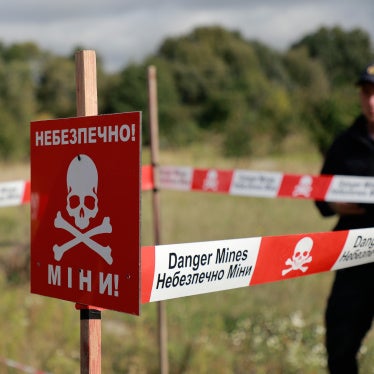- Thailand fired cluster munition rockets into Cambodia during border clashes in February 2011;
- Cluster bombs were dropped on two locations in Libya in early 2015, but it was not possible to conclusively determine responsibility. Previously, in April 2011, Libyan government forces loyal to Muammar Gaddafi fired cluster munition mortar rounds into the city of Misrata;
- Cluster bombs were dropped near the South Sudanese town of Bor in early 2014, but it is unclear who was responsible for this use;
- Sudan’s armed forces used air-dropped cluster bombs in Southern Kordofan province in the first half of 2015, and previously in 2012;
- Syrian government forces began using air-dropped cluster bombs in mid-2012 and then cluster munition rockets in attacks that are believed to be continuing, while the extremist group Islamic State (also known as ISIS) forces used cluster munition rockets in the second half of 2014;
- Ukrainian government forces and Russian-backed anti-government forces used cluster munition rockets in Donetsk and Luhansk provinces of eastern Ukraine in attacks that started in 2014 and stopped after a February 2015 ceasefire; and
- One or more members of a Saudi Arabia-led coalition has used air-dropped and ground-fired cluster munitions in northern Yemen since March 2015 in operations against Houthi forces, also known as Ansar Allah.
The Convention on Cluster Munitions requires each state party to “make its best efforts to discourage States not party … from using cluster munitions.” More than 140 countries have condemned the new use of cluster munitions, including more than 48 non-parties. Most condemned the use through national statements as well as by joining resolutions by the United Nations General Assembly, the UN Security Council, and the UN Human Rights Council.
A total of 117 countries have signed or ratified the 2008 Convention on Cluster Munitions, which prohibits the use, production, transfer, and stockpiling of cluster munitions, and requires the clearance of cluster munition remnants within 10 years as well as assistance for victims of the weapons. Of these countries, 95 are states parties legally bound to carry out all of the convention’s provisions, while the other 22 have signed but not yet ratified the convention.
Since September 2014, Belize, Guyana, Palestine, and Slovakia have acceded to the convention, while signatories Canada, Republic of the Congo, Guinea, Iceland, Paraguay, Rwanda, and South Africa have completed their ratification.
According to Cluster Munition Monitor 2015, states parties have destroyed a total of 1.3 million stockpiled cluster munitions containing 160 million submunitions. This represents the destruction of 88 percent of all cluster munitions and 90 percent of all submunitions declared as stockpiled by the treaty’s states parties. In 2014 alone, more than 121,000 cluster munitions and 16.4 million submunitions were destroyed by France, Germany, Italy, Mozambique, Sweden, Switzerland, and other states parties. Japan completed its stockpile destruction in February, while Canada completed in 2014 before ratifying the convention in March 2015.
Most countries that have signed but not yet ratified the Convention on Cluster Munitions are in the process of ratification under their domestic laws. Colombia, Democratic Republic of the Congo (DRC), Madagascar, and Somalia, all of which have signed the treaty, appear to be the closest to completing ratification.
“The new use of cluster munitions has elicited a strong reaction from other countries, indicating that the stigma against these weapons continues to build as the treaty’s ban takes hold,” Wareham said. “Countries that care about protecting civilians should condemn any use of cluster munitions and put pressure on users to abide by and join the convention.”








